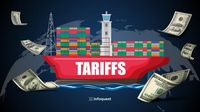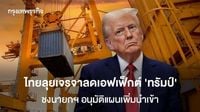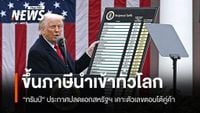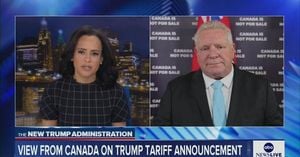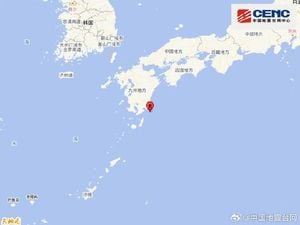On April 3, 2025, former U.S. President Donald Trump made a significant announcement regarding new tariff policies that are poised to shake up global trade dynamics, particularly affecting Thailand. During a press conference at the White House, Trump declared the implementation of reciprocal tariffs, which will impose a basic 10% tariff on all imports into the United States, while countries like Thailand will face a staggering 36% tariff on their goods. This announcement, which Trump labeled as a "day of liberation," aims to protect American industries by ensuring that foreign countries are held accountable for their own tariffs against U.S. products.
The ramifications of Trump's tariff policy are expected to be severe, with Thailand projected to incur losses between $7 billion and $8 billion due to the increased tariffs. The Thai Commerce Ministry has been proactive in addressing these concerns, as officials assess the potential impact on key sectors, including semiconductors, pharmaceuticals, and agricultural products like rice and shrimp. The Thai government is already in discussions to increase imports and reduce tariffs on essential goods from the United States to mitigate the anticipated economic fallout.
In a broader context, Trump's new tariffs are part of a larger strategy aimed at recalibrating trade relationships globally. The tariffs will vary significantly by country, with China facing a 34% tariff, Vietnam a staggering 46%, and other nations in the ASEAN region also seeing steep increases. For instance, Cambodia will see tariffs as high as 49%, while Laos and Myanmar will face 48% and 44%, respectively. This escalation has led to fears of retaliatory measures from affected countries, which could further complicate international trade.
Dr. Sanit Thirarattanaseth, a prominent Thai strategist, described the situation as a "global trade earthquake," warning that the ramifications of these tariffs could lead to increased competition for exports from Thailand and a potential influx of imports from other countries, particularly China. As countries scramble to adjust, the landscape of global commerce is likely to shift dramatically.
In response to Trump's tariffs, Thailand is considering several strategies to safeguard its economic interests. The government has set up a task force to negotiate trade agreements and explore ways to bolster agricultural imports from the U.S., which could help stabilize the trade deficit. Commerce Minister Phumtham Wechayachai emphasized the importance of these negotiations, stating that Thailand must act swiftly to protect its economic standing amid rising tensions.
Moreover, Thailand's participation in the SelectUSA Investment Summit 2025 in Washington, D.C., scheduled for April 11-14, is seen as a crucial opportunity to strengthen bilateral trade relations. The summit aims to promote investment and facilitate dialogue between Thai and American businesses, potentially leading to new partnerships that could offset the adverse effects of the tariffs.
In the wake of these developments, the Thai government is also focusing on reducing tariffs on certain imports to encourage trade. For example, the Thai government plans to lower import duties on liquefied natural gas (LNG) and automobiles significantly, with reductions of 2% and 32%, respectively. These measures are designed to enhance Thailand's competitiveness and attract foreign investment, particularly from the U.S.
As Thailand navigates this tumultuous trade landscape, there is a palpable sense of urgency among government officials and business leaders alike. The potential for retaliatory tariffs from other nations remains a significant concern, as countries react to Trump's aggressive trade policies. Thailand's strategic approach will involve not only immediate measures to alleviate the impact of the tariffs but also long-term plans to fortify its trade relationships and enhance its economic resilience.
In conclusion, the unfolding trade war initiated by Trump's new tariff policies presents both challenges and opportunities for Thailand. As the country grapples with the immediate effects of increased tariffs, it is also poised to explore new avenues for growth and collaboration with international partners. The coming weeks will be critical as Thailand seeks to balance its trade interests while maintaining a robust relationship with the United States and other key trading partners.
